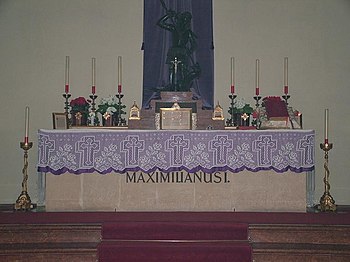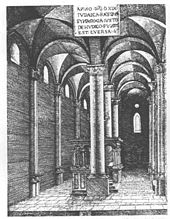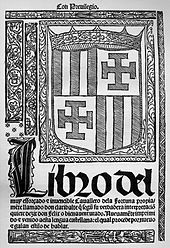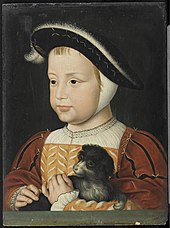1519
Portal history | Portal Biographies | Current events | Annual calendar
◄ |
15th century |
16th century
| 17th century
| ►
◄ |
1480s |
1490s |
1500s |
1510s
| 1520s
| 1530s
| 1540s
| ►
◄◄ |
◄ |
1515 |
1516 |
1517 |
1518 |
1519
| 1520
| 1521
| 1522
| 1523
| ►
|►►
| 1519 | |
|---|---|
| Hernán Cortés begins the Spanish conquest of Mexico . | |
| The Portuguese navigator in Spanish service Ferdinand Magellan begins the first circumnavigation of the world . | Ulrich Zwingli becomes a people priest at the Grossmünster in Zurich. |
| Emperor Maximilian I dies in Wels Castle . | |
| 1519 in other calendars | |
| Armenian calendar | 967/968 (turn of the year July) |
| Ethiopian calendar | 1511/12 |
| Aztec calendar | 13. Rabbit - Matlactli omey Tochtli (until the end of January / beginning of February: 12th house - Matlactli omome Calli ) |
| Buddhist calendar | 2062/63 (southern Buddhism); 2061/62 (alternative calculation according to Buddhas Parinirvana ) |
| Chinese calendar | 70th (71st) cycle
Year of the Earth- Rabbit 己卯 ( at the beginning of the year Earth-Tiger 戊寅) |
| Chula Sakarat (Siam, Myanmar) / Dai calendar (Vietnam) | 881/882 (turn of the year April) |
| Dangun era (Korea) | 3852/53 (October 2/3) |
| Iranian calendar | 897/898 |
| Islamic calendar | 924/925/926 (turn of the year 2/3 January // 22/23 December) |
| Jewish calendar | 5279/80 (August 26-27) |
| Coptic calendar | 1235/36 |
| Malayalam calendar | 694/695 |
| Seleucid era | Babylon: 1829/30 (turn of the year April)
Syria: 1830/31 (turn of the year October) |
| Vikram Sambat (Nepalese Calendar) | 1575/76 (turn of the year April) |
1519 is a year of upheaval: Emperor Maximilian I dies in the Holy Roman Empire , succeeded to the throne by his grandson Karl I, King of Spain , under the name of Charles V. Karl, who wins the election against the French King Franz I , will become the ruler in the next few years " in whose empire the sun does not set ".
While Huldrych Zwingli takes up his post as a people priest at the Grossmünsterstift in Zurich and thus brings the Reformation to Switzerland , Martin Luther makes the final and irreversible break with the Roman Church in the Leipzig disputation against Johannes Eck .
The Spanish conquistador Hernán Cortés leads an expedition into the Mexican highlands and begins the Spanish conquest of Mexico and the destruction of the Aztec Empire .
On behalf of Spain, the Portuguese Fernão de Magalhães (Magellan) is setting out on a journey that will take us around the earth in two years' time and which will provide the ultimate proof of the earth's spherical shape .
Events
Politics and world events
Holy Roman Empire
King election after the death of Maximilian I.
Emperor Maximilian I dies on January 12th on the way from Innsbruck to the state parliament in Linz in Wels Castle . With his death, his grandson Karl , who is already King of Spain , also becomes Archduke of Austria . According to his will, Maximilian is buried in his baptismal church, the St. George's Chapel of the castle in Wiener Neustadt , in the vestments of the Order of St. George under the steps of the Gothic high altar. The tomb commissioned by him , however, remains unfinished for the time being, because the associated bronze figures are too heavy for the chapel.
Duke Ulrich von Württemberg tries to use Maximilian's death for himself and attacks the Free Imperial City of Reutlingen on January 28th . However, he is involved in a war with the Swabian Confederation . In March / April he sent a force under Georg von Waldburg-Zeil , Ulrich was defeated and driven out of Württemberg , the duchy was placed under Austrian administration. Ulrich's four-year-old son Christoph becomes a noble boy at Karl's court in Innsbruck, his succession is uncertain. Ulrich's attempt to recapture his duchy fails in September / October.

The Spanish King Charles I , who was stylized as a “German candidate” by his Grand Chancellor Mercurino Arborio di Gattinara , wins the election of Roman-German King against Francis I of France on June 28th . The transfer of 851,918 guilders to the seven electors by the banker Jakob Fugger led to their unanimous vote in the election of Charles. Shortly before the election is Friedrich III. (the way) resigned as a candidate. Karl signs an election surrender in which he confirms all regalia, privileges and imperial pledges of the imperial princes. He also promises to set up a Reich regiment . The fear of foreign rule is expressed in the provisions that only Germans should be assigned to important Reich offices and that foreign warriors may not be stationed on the soil of the Reich. The curia’s claims for money are also to be limited and the large trading companies abolished.
Persecution of Jews in Regensburg
On February 21 , the Regensburg city council ordered the expulsion of the Jews from the city after Christian craftsmen had demanded it. The people of Regensburg use the power vacuum after the death of Emperor Maximilian I. The old Jewish quarter is destroyed and the lucrative pilgrimage “To the beautiful Maria” takes place on today's Neupfarrplatz . All Jews have to leave the city within two weeks . The ghetto , including the synagogue and school, is burned down, pledges are confiscated, and valuable parchment manuscripts are misused as binding material for files and books. The cemetery is desecrated, most of the more than four thousand gravestones are destroyed, but some of them are also stolen by the citizens of Regensburg with the approval of the council and built into house walls as a visible macabre trophy of the “victory” over the Jews. Some of these so-called Jewish stones are still preserved today.
Hildesheim collegiate feud
Between the Bishopric of Hildesheim and the Guelph principalities Brunswick-Wolfenbüttel and Calenberg breaks Hildesheimer pin feud from. After futile sieges of fortresses in Calenberg and in Hildesheim by hilde domestic or Brunswick troops and numerous devastation and plundering of both sides against civilians, and among other things the castle Peine vain siege and the city is burned Peine, witnessed the feud on June 28 their The climax is the Battle of Soltau , the last known knight's battle . The Hildesheimers under Prince-Bishop Johannes IV of Saxony-Lauenburg defeat the Brunswick troops, kill 3,500 men and take Erich von Calenberg and many nobles prisoner. Prince Heinrich the Younger of Braunschweig-Wolfenbüttel then called the new Emperor Charles V, with whom he had good relations, as arbitrator.
confederation
- Origin and growth of the Old Confederation : Rottweil becomes a place facing the Swiss Confederation .
Teutonic Order State / Poland
- December 31 : The equestrian war between the Teutonic Order and Poland begins with the attack on the Warmia city of Braunsberg by Grand Master Albrecht of Brandenburg-Prussia . It is the last military attempt by the Order to liberate the Teutonic Order State in East Prussia from the feudal rule of Poland under Albrecht's uncle Sigismund I.
Kalmar Union
- September: Gustav Wasa , who is held prisoner at Kalø Castle by the Danish King Christian II with five other Swedish nobles , manages to escape to Lübeck.
- In the fight against rebellious Sweden and to restore the Kalmar Union , the Danish fleet leader Søren Norby conquers the island of Öland with Borgholm Castle .
Italy / France
On April 28 , 15 days after the birth of her daughter Caterina , Madeleine de la Tour d'Auvergne dies of the consequences of the difficult delivery. When Catarina's father Lorenzo di Piero de 'Medici , city lord of Florence and Duke of Urbino , died of a serious illness on May 4th, her great-uncle Pope Leo X took over the guardianship of the newborns. King Francis I of France wishes the orphan - thanks to her mother a very wealthy heiress - to grow up at the French court. Leo X, however, does not follow this request, but has Caterina brought from Florence to Rome, appoints her Duchess of Urbino and later plans to marry her to the son of his brother Giuliano de 'Medici , Ippolito de' Medici , who also died at an early age .
After Lorenzo's death, his relative Giulio de 'Medici became the lord of the city of Florence .
Spanish conquests in the "New World"
Mexico
Diego Velázquez de Cuéllar , governor of Cuba , withdraws his former secretary and current mayor of Santiago de Cuba , Hernán Cortés , for fear of his ambition to organize an expedition to Mexico last year. Unimpressed by this, Cortés continued his preparations and set off from Havana on February 18 with 11 ships and 670 men . A little later, the flotilla lands on the island of Cozumel off the Yucatán . There the locals tell them about two Christians who have lived with the Maya for several years . One of them, Gerónimo de Aguilar , can be found after a short search and joins them enthusiastically, the other, Gonzalo Guerrero , has achieved high esteem among the Maya and refuses to leave his new home.
On March 12th, the Spaniards land near Potonchán on the Tabasco River, where fighting with the Chontal Maya broke out two days later. Their Halach Huinik (highest-ranking prince) Tabscoob gives them numerous treasures and 20 slaves, among them 14-year-old Malinche, after his defeat on March 15th as a token of devotion . Together with Gerónimo de Aguilar , she is very helpful to the Spaniards through her knowledge of the Mayan and Aztec languages, Nahuatl , and later becomes Cortés' lover.
On April 21, Hernán Cortés lands on the coast of Mexico near San Juan de Ulúa near the present-day city of Veracruz . Moctezuma learns of the landing of the Spaniards and sends them a delegation of his closest confidants. He gives them gifts made of gold and precious stones, clothing and magnificent feather ornaments. However , he refuses Cortés' request to visit him in Tenochtitlán . With his generous gold gifts, Moctezuma wants to appease the strangers and get them to leave the country, but does the opposite. The Totonaks , a vassal tribe of the Aztecs, now contact Cortés and form an alliance with him.
Although his mission to explore the area is fulfilled with the landing, Cortés refuses to allow his soldiers to return to Cuba and instead founds the settlement of Villa Rica de la Vera Cruz . He sets up a city council, who appoints him captain general, as such subordinates him directly to the crown and thus releases him from his duties towards Velázquez. To win the crown for his cause, he sends a ship to Spain with all the gold the newcomers can find; He has all other ships sunk out of fear of desertions. On August 16, he marched with several hundred Spaniards and his Totonak allies into the interior.
In Tlaxcala it comes on September 4 to attacks Tlaxcaltecs that can be averted only with the help of firearms. The Kazike Xicoténcatl the Elder finally makes peace with the Spaniards after several days of fighting and provides them with urgently needed food. As a sign of loyalty, he married his daughter to the Spanish captain Pedro de Alvarado .
After learning that a force from Tenochtitlán was approaching, the Spaniards and their Tlaxcaltec allies massacred several hundred people in a pre-emptive strike in the Aztec city of Cholula on October 18 , including the city's upper class and the king in his place a puppet king is used, who also allies with the Spaniards.

On November 8th , Cortés' force reached the Valley of Mexico and the city of Tenochtitlan and was received by Moctezuma at the gates of the capital. The Aztec ruler lets the Spaniards assign the palace of his late father Axayacatl as an apartment. Tenochtitlán was built on some islands in Lake Texcoco and is only connected to the mainland by three dams.
During a battle between the Aztecs and the garrison that remained in Veracruz , the commander Juan de Escalante and several of his men were killed around November 10th . The head of one of the men is sent to Moctezuma in Tenochtitlán. Cortés then captures Moctezuma and takes him to the Spaniards' quarters. The Aztec captains who fought against Escalante are convicted and publicly burned.
- November: Diego de Ordás climbs the Mexican volcano Popocatépetl together with two other conquistadors and sets a world altitude record that will last for centuries. Emperor Charles V then allowed de Ordás to include a smoking volcano in his coat of arms .
Other places in the Spanish Empire
- November 16 : The port city of Havana in Cuba is relocated to its current location.
- August 15 : The Spanish governor Pedro Arias Dávila founds Nuestra Señora de la Asunción de Panamá , today's Panama City .
Magellan's circumnavigation
Because of the candidacy of the Spanish King Charles I as the Roman-German King, Ferdinand Magellan's planned expedition in the spring ran into a financial bottleneck, from which she could only free herself when the merchant Cristóbal de Haro became an investor. There was a further delay in the summer because too few Spanish seafarers were willing to take part in the risky voyage, and Magellan had the ranks filled with Portuguese compatriots - which in turn made his clients uncomfortable. They enforce a numerical limit for sailors and cabin boys from Portugal. In addition, Magellan sacrifices his partner Rui Faleiro , who is deposed as the second captain next to Magellan and excluded from the expedition.

From Seville , Ferdinand Magellan's fleet begins his planned journey in search of the Spice Islands on August 10th . Magellan himself is not on board; he only follows after he has drawn up his will on August 24th . His fleet, consisting of the ships Trinidad , San Antonio , Concepción , Victoria and Santiago , sails down the Guadalquivir towards the ocean under the imperial flag of the Holy Roman Empire . In Sanlúcar de Barrameda , Magellan has to wait five weeks as the Spanish authorities try to obstruct the native Portuguese's journey. The fleet can not set sail until September 20 . King Manuel I of Portugal sends ships to Brazil and southern Africa to block the way for the fleet, a project that does not succeed.
Magellan's ships will take provisions on the Canary Island of Tenerife on September 26th . On October 3rd they reached Cape Verde , on November 20th the equator is crossed. Due to the far south running course, the fleet gets out of the Passat zone and loses time. The Spanish captains therefore confront the Commander-in-Chief. Magellan regards this as an affront and lets the next commanding officer Juan de Cartagena, who as conjunta persona , as assigned to the captain general, feels equal to him and makes this clear in the dispute.
The fleet reached South America on December 6th and anchored on December 13th in a bay that Magellan calls Bahia de Santa Lucía , today's Rio de Janeiro bay . The indigenous people there consider the whites to be gods, since rain falls at the same time as they arrive for the first time in a long time, and are therefore friendly to them. In order not to overlook the presumed paso , the passage into the South Sea, the fleet is slowly feeling its way down the South American coast until the end of the year.
economy
- End of the year: On the instructions of Count Schlik , the first Joachimsthalers are probably struck in the Sankt Joachimsthal mint in Bohemia without permission .
Culture
| Culture | |
|---|---|
|
Visual arts
Georg Spalatin , the mediator between Martin Luther and the Elector Friedrich III. von Sachsen , ensures that a 60 centimeter high statue of the Madonna , later known as the Spalter Madonna , arrives as a gift from the Wittenberg Heiltums collection in the church of St. Emmeram in his home town of Spalt . The figure, created by an unknown master, shows Mary with the baby Jesus on her left arm and was probably created on the occasion of a great indulgence the previous year.
literature
- Gonzalo Fernández de Oviedo publishes the courtly novel Claribalte .
religion
Church hierarchy
- After Lorenz von Bibra's death on February 6, he was succeeded by Konrad II von Thüngen as Prince-Bishop of Würzburg .
- Matthäus Lang von Wellenburg , the previous coadjutor , succeeds Leonhard von Keutschach , who died on June 8th, as Archbishop of Salzburg .
- August 17th : Guillaume III. de Croÿ , Archbishop of Toledo since 1517 , renounced the diocese of Cambrai in favor of his younger brother Robert de Croÿ , who took over the diocese at the age of 19. He was ordained a bishop ten years later.
reformation
On January 1st, after three years in Einsiedeln, Ulrich Zwingli came to the Grossmünsterstift in Zurich as a people priest , where he convinced the people and the city council of the Reformation with his sermons .
Between June 27 and July 16, a theological debate between the Ingolstadt theologian Johannes Eck and the Wittenberg theologians Martin Luther and Andreas Karlstadt will take place in Leipzig . At the Leipzig disputation , differences in the grounds for the papal office become evident. Eck got Luther to accept the theses of Jan Hus , who was condemned by the Council of Constance , whereby Luther relativized the authority of councils as well as the authority of the Pope.
Disasters
- A new wave of plague has been spreading in Europe since the previous year , which among others fell victim to the preacher of indulgence, Johann Tetzel .
- 1518/1519 : The smallpox introduced by the Spaniards causes devastating epidemics among the indigenous people.
Born
First half of the year

- January 18 : Isabella Jagiellonica , Polish-Lithuanian princess, Queen of Hungary († 1559 )
- February 5 : Renatus , Prince of Orange, Lord of Breda and Count of Vianden († 1544 )
- February 6 : Georg IV. Fuchs von Rügheim , Bishop of Bamberg and Prince-Bishop of the Bamberg Monastery († 1561 )
- February 16 : Gaspard II. De Coligny , French nobleman, admiral and Huguenot leader, one of the first victims of St. Bartholomew's Night († 1572 )
- February 17 : François de Lorraine , Duke of Guise, French military leader and statesman († 1563 )
- February 19 : Froben Christoph von Zimmer , Swabian nobleman and chronicler († 1566 )
- March 1 : Petrus Vincentius , German rhetorician, ethicist, dialect and educator († 1581 )
- March 14 : Eustachius von Knobelsdorff , German neo-Latin poet and epic poet († 1571 )
- March 17 : Thoinot Arbeau , French canon and author († 1595 )
- March 31 : Henry II , King of France († 1559 )
- March 31 : Johann Konrad Ulmer , Protestant theologian and scholar with many interests († 1600 )
- April 13 : Caterina de 'Medici , Queen and Regent of France († 1589 )
- May 3 : Konrad Matthäus , German lawyer († 1580 )
- May 27 : Girolamo Mei , Italian historian and humanist († 1594 )
- June 6th : Andrea Cesalpino , Italian doctor, philosopher, botanist and physiologist († 1603 )
- June 12 : Cosimo I de 'Medici , Duke of Florence and Grand Duke of Tuscany († 1574 )
- June 15 : Henry Fitzroy, 1st Duke of Richmond and Somerset , English nobleman, illegitimate son of King Henry VIII († 1536 )
- June 23 : Johannes Goropius Becanus , Dutch doctor, linguist and humanist († 1572 )
- June 24th : Théodore de Bèze , Geneva reformer of French origin († 1605 )
- June 29 : Johann Kittel , German theologian and pedagogue († 1590 )
Second half of the year
- July 10 : Konrad zu Castell , ruler of the county of Castell († 1577 )
- July 13 : Ulrich von Mordeisen , Saxon politician and diplomat († 1572 )
- July 20 : Giovanni Antonio Facchinetti, under the name of Innocent IX. Pope († 1591 )
- September 7th : Matthäus Vogel , German Protestant theologian († 1591 )
- September 21 : Hugolin Martelli , Bishop of Glandèves († 1592 )
- September 23 : François de Bourbon, comte d'Enghien , French prince and general († 1546 )
- October 2 : Rudolf Gwalther , Zurich Reformed theologian and reformer († 1586 )
- October 14 : Marie von Brandenburg-Kulmbach , Electress of the Palatinate († 1567 )
- November 16 : Willibald Imhoff , Nuremberg patrician, art collector, merchant and banker († 1580 )
- 20 / 22 November : Johann Crato of Krafftheim , German humanist and physician († 1585 )
- December 12 : Nikolaus Varnbuler , Württemberg lawyer and diplomat († 1604 )
- December 20 : Johann Schneidewein , German lawyer († 1568 )
Exact date of birth unknown
- Jerónimo de Alderete , Spanish conquistador († 1556 )
- Giovanni Maria Barbieri , Italian philologist and Romanist († 1574 )
- Hendrick van den Broeck , Flemish painter and engraver († 1597 )
- Catherine of Cordona , Catalan noblewoman († 1577 )
- Thomas Gresham , co-owner of the largest English trading house of his era († 1579 )
- Edmund Grindal , Archbishop of Canterbury and York, Bishop of London († 1583 )
- Kaspar Gropper , Catholic theologian, church politician and lawyer († 1594 )
- Rütger von der Horst , Lower Rhine Ministeriale († 1582 )
- Imagawa Yoshimoto , Japanese warlord († 1560 )
- Kanō Shōei , Japanese painter († 1592 )
- Johann Kerkring , Councilor of the Hanseatic City of Lübeck († 1595 )
- Hermann von Kerssenbrock , Rector of the Paulinum Grammar School in Münster († 1585 )
- Kılıç Ali Pasha , Ottoman admiral and corsair († 1587 )
- Pedro Menéndez de Avilés , Spanish admiral, first governor of the Spanish colony of Florida († 1574 )
- Hieronymus Opitz the Elder , German Lutheran theologian († 1591 )
- Stanisław Ostroróg , castellan of Międzyrzecz and Kamień Pomorski, leader of the Reformation in Greater Poland († 1568 )
- Bernard Gilles Penot , French alchemist and doctor († 1617 )
- Claude de Rohan-Gié, Comtesse de Thoury , French noblewoman, one of the last mistresses of the French King Francis I († after 1579)
- Edwin Sandys , Bishop of Worcester and London, Archbishop of York († 1588 )
- Laurence Saunders , English clergyman and evangelical martyr († 1555 )
- Adam von Schwalbach , Grand Prior of Germany of the Order of St. John and Imperial Prince von Heitersheim († 1573 )
- Damian von Sebottendorf , German Councilor, Reichspfennigmeister in the Upper and Lower Saxon Imperial Circle, secret secretary for the Elector Moritz von Sachsen († 1585 )
- Giovanni Antonio Serbelloni , Italian bishop and cardinal († 1591 )
Born around 1519
- Girolamo Benzoni , Italian traveler and historian († after 1572)
- 1519/ 1520 : Pir Mehmet , the Ottoman poet, historian, translator and biographer († 1571 )
Died
January to April
- January 1st : Ulrich Pinder , personal physician to Elector Friedrich III. von Sachsen, publisher and printer
- January 12 : Maximilian I von Habsburg, Holy Roman Emperor (* 1459 )
- January 14 : Wendelin Steinbach , German theologian (* 1454 )
- January 21 : Luigi d'Aragona , Cardinal of the Catholic Church (* 1474 )
- January: Maria von Baden , Princess of Baden, abbess of the Lichtenthal Monastery (* 1473 )
- January: Vasco Núñez de Balboa , Spanish explorer, conquistador and adventurer (* 1475 )
- between February 1st and 9th: Václav Koranda von Pilsen , Bohemian Hussite theologian and university master (* between 1422 and 1424)
- February 6th : Lorenz von Bibra , Prince-Bishop of Würzburg (* 1459 )
- March 29 : Francesco II Gonzaga , Margrave of Mantua (* 1466 )
- March: Dorothea von Brandenburg , Duchess of Saxony-Lauenburg (* 1446 )
- April 12th : Georgius Eberhard , abbot at St. Blasien monastery in the southern Black Forest
- April 15 : Heinrich von Württemberg , Count of Württemberg-Mömpelgard (* 1448 )
- April 18 : Sibylle of Bavaria , Electress of the Palatinate (* 1489 )
- April 19 : Thuringia Fricker , Swiss politician (* around 1429 )
- April 28 : Madeleine de la Tour d'Auvergne , Countess of Auvergne, mother of Caterina de 'Medici (* 1495 )
May to August
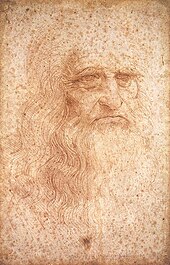
- May 2 : Leonardo da Vinci , Italian polymath, painter, sculptor, architect, anatomist, mechanic, engineer and natural philosopher (* 1452 )
- May 3 : Magnus Hundt , German philosopher, doctor, anatomist and theologian (* 1449 )
- May 4th : Lorenzo di Piero de 'Medici , Duke of Urbino and ruler of Florence (* 1492 )
- May 9 : Jodocus Trutfetter , German Catholic theologian, logician, rhetorician and philosopher (* around 1460 )
- May 13 : Artus Gouffier de Boisy , French statesman, Grand Master of France (* 1474 )
- May 28 : Bernardo Bembo , statesman of the Republic of Venice (* 1433 )
- June 2 : Philip of Luxembourg , Cardinal of the Catholic Church (* 1445 )
- June 8 : Leonhard von Keutschach , Archbishop of Salzburg (* around 1442 )
- June 24 : Lucrezia Borgia , Spanish-Italian Renaissance princess, Duchess of Ferrara (* 1480 )
- July 3 : Gallus Kopf , librarian at the St. Gallen Monastery
- July 3 : Degenhart Pfäffinger , south German nobleman (* 1471 )
- July 27 : Zanobi Acciaioli , Italian Dominican (* 1461 )
- July 29th : Wolfgang , Count of Ortenburg
- August 11 : Johann Tetzel , preacher of indulgence in various German countries (* 1465 )
- before August 14: Steffen Arndes , Lübeck incunabulum printer (* around 1450 )
- August 20 : Luigi de 'Rossi , Cardinal of the Catholic Church (* 1474 )
- August 22 : Heinrich III. von Plauen , Burgrave of Meißen, captain of the Bohemian fiefdom and governor of Lower Lusatia (* around 1453 )
- August 23 : Philibert Berthelier , Geneva politician (* around 1465 )
September to December
- September 9 : René de Prie , Cardinal of the Catholic Church (* 1451 )
- September 18 : John Colet , English Catholic priest and theologian (* 1467 )
- September 21 : Hans Backoffen , Mainz sculptor (* around 1470 )
- September 22nd : Johann Mohr von Leun , Saxon Ministeriale (* around 1445 )
- October 6 : Peter Falck , Swiss politician, diplomat and scholar (* around 1468 )
- about November 10th : Juan de Escalante , Spanish captain and conquistador, member of the Cortés expedition to Mexico, commander of the garrison in Veracruz
- November 20 : Andries Boelens , Mayor and Regent of Amsterdam (* 1455 )
- November 27 : Antoine Bohier Du Prat , Cardinal of the Catholic Church (* 1460 )
- November 30th : Michael Wolgemut , German painter, wood carver and chronicler (* 1434 )
- December 2 : Maddalena de 'Medici , Florentine noblewoman (* 1473 )
- December 25th : Rudolf von Langen , cathedral canon in Münster and early humanist (* around 1438 )
- December 25th : Adam Schönwetter von Heimbach , German lawyer (* around 1465 )
Exact date of death unknown
- Summer: Hans Meiger von Werde , German stonemason, master builder and architect
- Elisabeth von Bach , South German nobleman and accused in a poisoning trial (* before 1475)
- Sebold Bocksdorfer , South German carver, sculptor, sculptor and artisan
- Günther von Bünau , canon and dean of Naumburg Cathedral (* before 1469)
- Wilhelmus Grimetre , Swiss priest, scribe and owner of manuscripts and incunabula (* 1436 )
- William Grocyn , English scholar and humanist (* around 1446 )
- Gregor Günther , German canon lawyer (* before 1480)
- Hans von Ulm , Wuerttemberg master mason and stonemason (* around 1460 )
- Jo Gwang-jo , Korean politician, reformer and neo-Confucian philosopher (* 1482 )
- Juan de Flandes , Dutch painter (* 1465 )
- Kunz von der Rosen , advisor and court jester to the German King Maximilian I (* around 1470 )
- Johann Lindemann , Mayor of Leipzig (* 1475 )
- Sebastian von Mistelbach , German knight, manor owner and court official from Electoral Saxony
- Antonio Ormanni , craftsman in Siena (* 1457 )
- Diogo Ortiz de Vilhegas , Portuguese cosmographer, theologian and bishop of Spanish origin (* 1457 )
- Jan Polack , Polish / German painter (* around 1450 )
- Alonso de Proaza , Spanish humanist and university teacher (* 1445 )
- Lukas Schleppel , titular bishop of Thermopylae / Mundinitza and auxiliary bishop in Speyer
- Daniel Wassiljewitsch Schtschenja , Russian prince (* before 1450)
- Dietrich Wichwael , auxiliary bishop in Cologne




